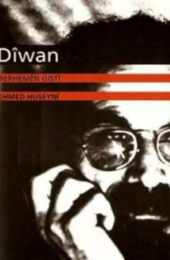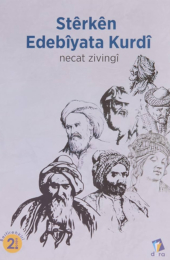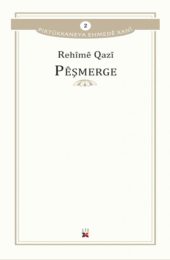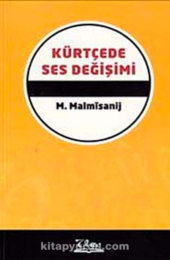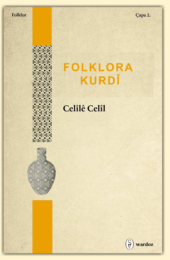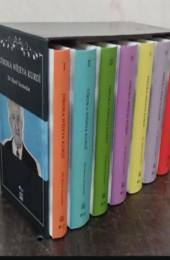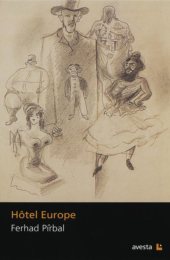Dîwan
Overview:
Dîwan Ehmed Huseynî refers to the literary works of Ehmed Huseynî, a Kurdish writer born in Amûd in 1955.
His literary works are in the Kurdish language, falling under the genres of poetry and literature[6].
Ehmed Huseynî's contributions to Kurdish literature include a diverse range of poetic and literary works, leaving a lasting impact.
Director: Ehmed Huseynî
Stêrkên Edebîyata Kurdî
"Stêrkên Edebîyata Kurdî Necat Zivingî" refers to the literary contributions of Necat Zivingî to Kurdish literature. Necat Zivingî, a Kurdish author, explores the state of Kurdish literature globally, examining its influence by Kurdish states, Kurdish intellectuals, schools, and Eastern cultures. The role of women in Kurdish literature is also a focal point. Necat Zivingî has shared insights through various platforms like YouTube, discussing topics such as language, culture, and the intersection of Kurd and Islam . His book "Stêrkên Edebîyata Kurdî" provides an in-depth exploration of Kurdish literature, and it is available for purchase. Additionally, Zivingî has contributed to an anthology titled "Stêrkên edebîyata kurdî" in 2015, further emphasizing the discussion on Kurdish literary achievements
Director: Necat Zivingî
Pêşmerge
Pêşmerge Rehîmê Qazî" refers to the Kurdish novel written by Rehîmê Qazî titled "Pêşmerge." The novel is a significant work in Kurdish literature, portraying the struggles and heroic deeds of the Kurdish Pêşmerge (guerrilla fighters) through a narrative rich in Kurdish cultural elements .
Rehîmê Qazî wrote "Pêşmerge" in Kurmanji Kurdish, using the Roman script . The novel was first published in 1958, marking an early contribution to Kurdish literature. Rehîmê Qazî's work gained recognition for its portrayal of Pêşmerge fighters during a critical period in Kurdish history .
Director: Rehîmê Qazî
Destpêka Edebîyata Modern
The beginning of modern Kurdish literature in the Istanbul stage, with the appearance of some Kurdish writers and the cradle of the beginning of modern Kurdish literature, such as Memê Alan.
The book "Modern Kurdish Literature" written by Ramazan Alan focuses on the beginning of Kurdish literature and presents its views and examples.
Ramazan Alan has written about "Colonial Studies, National Image and an Inverted Cliché in Modern Kurdish Literature".
With the teacher Zulkif Ergun, Ramazan Alan quickly created a standardized curriculum for all classes in the field of modern literature.
Kürtçede Ses Değişimi
In Kürtçe (Kurdish), like any language, phonetic changes occur over time and space. "Kürtçede Ses Değişimi" (Phonetic Changes in Kurdish) by M. Malmisanij explores these linguistic transformations. The book emphasizes that language, being dynamic, evolves with shifts in time and place, impacting various aspects, particularly in phonetics. For those intrigued by the subject, "Kürtçede Ses Değişimi" offers valuable insights into the dynamic nature of the Kurdish language.
Director: Malmisanij
folklora kurdî
Celîlê Celîl: A Kurdish historian and Kurdologist, born in Yerevan to a Yazidi Kurdish family in 1936.
Contributions: Celîlê Celîl has dedicated decades to studying and writing about Kurdish folklore. His work includes numerous books on Kurdish folklore, making significant contributions to the understanding of Kurdish cultural heritage. "Dîdarok û Qewlikên Zarokan" and "Zêmar" are among his notable works on Kurdish folklore. Celîlê Celîl has left a lasting impact on the understanding and preservation of Kurdish cultural heritage through his extensive work in folklore. His contributions continue to be recognized, and his books remain valuable resources for those interested in Kurdish folklore and cultural history. Celîlê Celîl's dedication has significantly enriched the appreciation of Kurdish heritage.
Director: celîlê celîl
Mêjûy Edebî Kurdî
Mêjûy Edebî Kurdî Maruf Xeznedar refers to the literary magazine or periodical titled "مێژووى ئهدهبى کوردى / Mêjûy edebî Kurdî" created by Maruf Xeznedar (Marif Khaznadar) .
Maruf Khaznadar (1930–2010) was a contemporary Kurdish academic and writer, born in Erbil . He authored works such as "Le Babet Mêjûy Ede bi Kurdiyewe," a significant contribution to Sorani Kurdish literature.
His literary contributions include "Mêjûy Edebî Kurdî (1801-1850)" and other writings, reflecting his dedication to Kurdish literature.
The magazine is written in Kurdish, particularly in Sorani Kurdish.
Director: Maruf Xeznedar
Hotêl Ewrûpa
"Hotêl Ewrûpa Ferhad Pîrbal" is a novel written by Ferhad Pîrbal, a Kurdish author who sought refuge in Paris from Iraqi persecution in the 1980s
The book is titled "Europa Hôtel" and was published in 2019 by Maurice Nadeau, with translations by Gaspard Karoglan and Arthur Quesnay .
The story revolves around a Kurdish narrator in Paris, particularly in the Montmartre area, working in a hotel named Hôtel Europe .
Conclusion: "Hotêl Ewrûpa Ferhad Pîrbal" is a poignant novel depicting the experiences of a Kurdish refugee in Paris, reflecting on themes of displacement and adaptation.
Director: Ferhad Pîrbal
